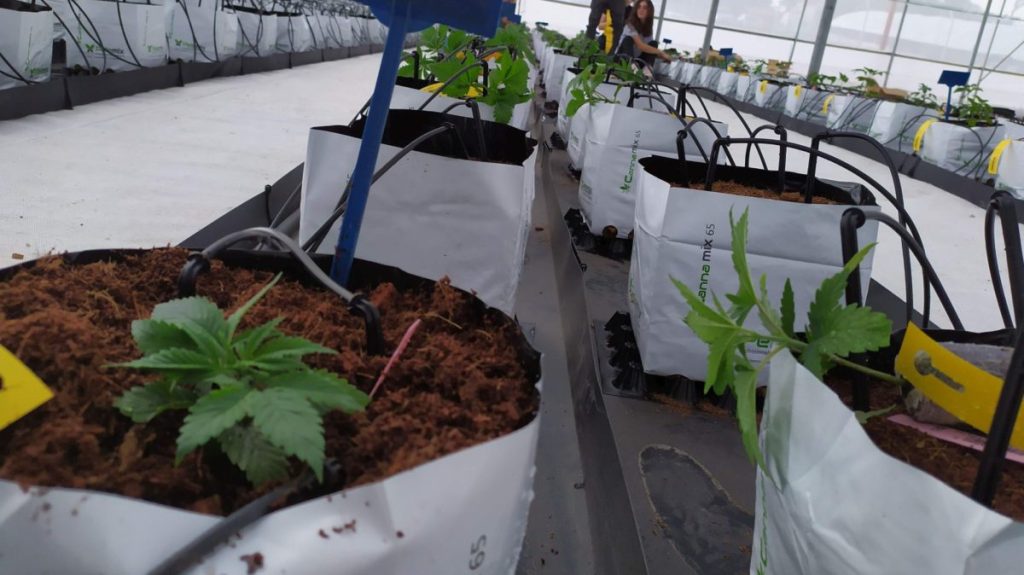The current U.S. hemp seed market is worth at least $1 billion a year. Into that ocean of opportunity, Israeli seed company CanBreed has launched a 3.5-acre licensed farm in San Diego County, California.
The little farm could make an outsized impact by producing what CEO Ido Margalit believes are the world’s first fully stable, consistent hybrid hemp seeds for standardized medical-grade cannabis.
“Our solutions will make a considerable disruption,” Margalit said.
“Israel is an agronomic superpower, but it cannot compete with countries that have a much larger capacity for agricultural output. What we do compete in well, and offer added value with, is technology. Seeds and genetics are technology, and that is a big strength.”

More than three years of research and development went into CanBreed’s answer to the problem of genetic instability in hemp seeds.
Legally, hemp cannabis plants grown in the United States can contain no more than 0.3 percent of THC, a powerful psychoactive compound. Practically, however, cultivators haven’t been able to control reproducibility and THC content to assure consistency in the finished product.
“Today, at least 20 percent of the nearly half a million acres of hemp grown in the U.S. is destroyed because THC surpasses that 0.3 percent level. Another 10 percent is destroyed along with weeds in the open fields,” said Margalit.
“Our stable, uniform hemp seeds give predictability to the grower. Our patented genome-editing technology edits out the gene responsible for the enzyme that makes THC, so these varieties are incapable of producing THC,” he said.
“The herbicide-resistant genes are edited so growers can spray weed killer. No fully dedicated seed company puts together these two traits,” Margalit said.

“That’s why we bought the farm in San Diego County. We can save 30 percent of the growing cycle in the U.S. By the end of 2021, we will start growing with a goal of 12 million seeds the first year and an eventual capacity of 50 million seeds annually.”
Given that farmers can sell hemp seeds in the U.S. for 50 cents to $1 per seed, even this small farm represents a huge market opportunity.
Nobel Prize-winning tech
Ido Margalit and Tal Sherman began CanBreed in 2017, bringing experience from their past positions with European seed giant Syngenta. As of 2020, it is a portfolio company of Tel Aviv’s Smart Agro Fund.

A staff of 21 employees, including 15 researchers, developed the YieldMax genetic trait portfolio using CRISPR-Cas9 gene-editing technology licensed from Corteva Agriscience and the Broad Institute of MIT and Harvard. The developers of CRISPR won the 2020 Nobel Prize in Chemistry.
“CRISPR technology is crop specific, and we are the first to successfully apply it in cannabis,” said Margalit.
“A lot of companies claim to apply CRISPR to cannabis, but up to now they have failed because of the same obstacles we managed to circumvent. We’re the only cannabis plant company to obtain a CRISPR license from the patent holders.”
The modified genes affecting THC expression and herbicide resistance, among others, are patented Israeli technologies, Margalit said.
CanBreed’s gene-editing capabilities could also adapt the structure of the hemp plant for mechanized harvesting; increase its protein content; and enable it to grow in different types of climates.
R&D farm in Israel
While it is developing its new $1 million farm in California, CanBreed also recently completed building the largest fully licensed cannabis seed research, breeding and seed production farm in Israel.

This 1.1-acre farm in Givat Chen has a permit from the Israeli Medical Cannabis Regulatory Authority to start experimenting with 30 stable varieties it developed and trial these varieties at several commercial cannabis farms in the country.
After those trials, probably in May, CanBreed plans to start producing the stable varieties it intends to commercialize for medical cannabis in the domestic market on a mass scale.
When the Israeli government permits exporting cannabis seeds, as is expected, the farm will supply markets around the world with its stable seeds, says Margalit.
“We’re also interested in China and Europe, but America is by far the biggest market.”
For more information, click here.
(Edited by Fern Siegel and David Martosko)
Israeli seed company launches cannabis farm in San Diego appeared first on ISRAEL21c.
The post Seed Tech: Israeli Co. Launches Cannabis Farm In San Diego, Edits Out Psychoactive THC appeared first on Zenger News.


